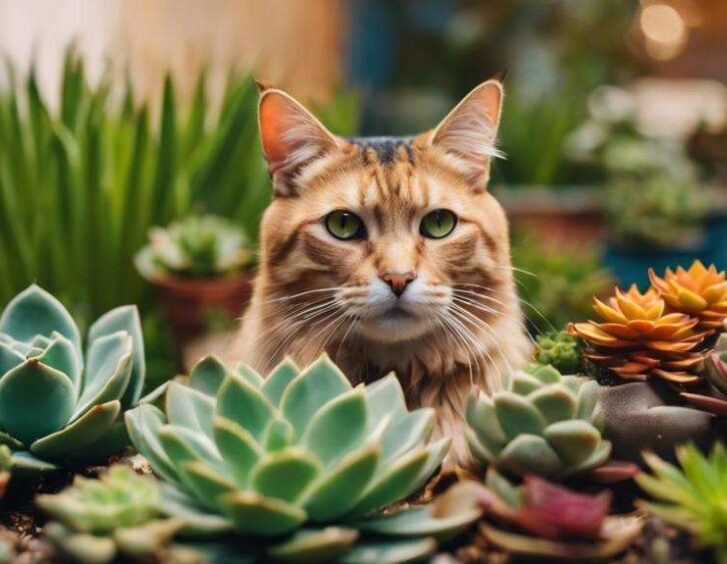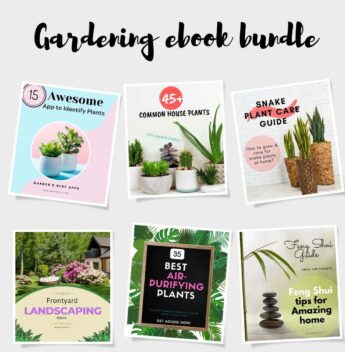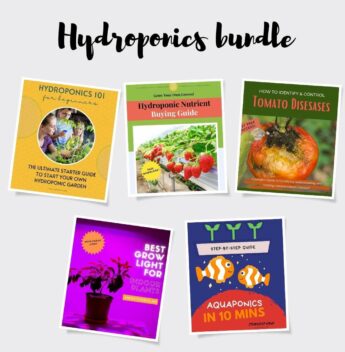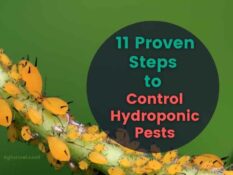When you're picking out succulents for your home, you're not just choosing plants – you're also making sure they're safe for your furry friends. Opting for pet-friendly succulents like Echeveria, Sempervivum, and Sedum is a smart move. These beauties are low-maintenance, great for both inside and outside, and they really brighten up any space.
On the flip side, toxic succulents such as Aloe vera, Kalanchoe blossfeldiana, and Crassula can spell trouble if your pets decide to nibble on them, leading to tummy issues like vomiting and diarrhea. It's best to keep these potentially harmful plants out of your pets' reach or simply go for the safer options.
By being mindful of the risks and choosing wisely, you can create a safe and peaceful environment for both your beloved pets and your lovely plants. As you delve deeper into the world of succulents, you'll uncover more helpful tips and insights to keep everyone happy and healthy.
Key Takeaways
• Pet-friendly succulent options include Echeveria, Sempervivum, and Sedum, which are safe for indoor or outdoor displays.
• Toxic succulents like Aloe vera, Kalanchoe blossfeldiana, and Crassula can cause vomiting and diarrhea in pets if ingested.
• Agave plants contain calcium oxalate crystals, causing oral and gastrointestinal irritation, and should be kept out of pet reach.
• Sansevieria and Euphorbia plants are hazardous to pets, causing nausea, vomiting, and diarrhea, and should be replaced with pet-friendly alternatives.
• Proper plant placement, handling, and care can prevent risks and ensure a safe coexistence between pets and plants.
Pet-Friendly Succulent Options
If you're looking to bring some greenery into your home without putting your furry friends at risk, consider opting for pet-friendly succulent options like Echeveria, Sempervivum, Haworthiopsis, Sedum, or Aeonium, all of which are non-toxic and safe for your pets to be around.
These succulents are perfect for indoor or outdoor displays, and with proper care, they'll thrive. To keep them happy, make sure to water sparingly, provide plenty of sunlight, and fertilize during the growing season.
You can also propagate them easily by separating offsets or leaf cuttings. With the right techniques, you can enjoy beautiful, pet-friendly succulents that bring life and style to your space.
Toxic Succulents to Avoid
When introducing succulents into your home, be cautious of toxic species like Aloe vera, Kalanchoe blossfeldiana, Senecio, and Crassula (jade plant), which can cause mild to severe symptoms in your pets if ingested. These plants contain toxic compounds that can harm your furry friends.
If you suspect your pet has ingested any of these succulents, recognize symptoms like vomiting, diarrhea, and lethargy. In case of an emergency, seek immediate veterinary care. Don't delay – prompt action can save your pet's life.
Keep these toxic succulents out of your pet's reach to avoid any potential risks. Opt for pet-friendly alternatives to guarantee a safe and happy home for both you and your pets.
Agave Plant Safety Precautions
To guarantee a safe coexistence with your pets, you should take agave plant safety precautions seriously, as these plants contain calcium oxalate crystals that can cause oral and gastrointestinal irritation in your furry friends.
When it comes to agave plant care, it's important to keep them out of your pet's reach. Consider placing them on higher shelves or in pet-safe landscaping, such as succulent beds, where your pets can't access them. Proper plant placement is vital to prevent any potential harm.
Sansevieria Hazards for Pets
You may think Sansevieria, also known as snake plants, are harmless, but they contain saponins that can cause mild to moderate symptoms in pets. Snake plant dangers are real, and it's important to take precautions to keep your pets safe.
If ingested, saponin toxicity can lead to nausea, vomiting, and diarrhea in pets. As a responsible pet owner, it's vital to keep Sansevieria out of your pet's reach to avoid potential pet hazards.
Consider replacing snake plants with pet-friendly alternatives to guarantee a safe environment for your furry friends. By taking these precautions, you can provide the best pet care possible and create a harmonious home for both your pets and plants.
Euphorbia Toxicity Risks
Euphorbia plants, including species like Euphorbia trigona, play a significant role in your pet's health due to their toxic sap and irritating spikes. When handling Euphorbia, you should take precautions to avoid skin contact and inhalation of the sap.
If you're looking for pet-safe alternatives, consider opting for succulents like Echeveria or Sedum instead. Identifying Euphorbia species is essential in toxicity management, as some species are more toxic than others.
For Euphorbia care tips, make sure to handle plants gently, avoid overwatering, and provide sufficient light. Remember, it's always better to prioritize your pet's safety and choose pet-friendly plants for your home.
Pet-Safe Succulent Gardening
When designing your indoor or outdoor space, incorporating pet-safe succulents like Echeveria, Sempervivum, and Sedum guarantees a safe and beautiful environment for both you and your furry friends.
As you explore pet-safe succulent gardening, remember that proper succulent care is essential. Water them sparingly, provide good drainage, and give them plenty of sunlight.
For indoor gardening, choose a pot that fits your decor, and don't forget to fertilize during the growing season. With minimal maintenance, these succulents will thrive, bringing joy and serenity to your space.
Toxic Plant Risks for Pets
What hidden dangers lurk in your home's greenery, threatening your pet's well-being and even their life? As you create a pet-friendly haven, it's important to be aware of common toxic plants that can harm your furry friends.
Pet safe landscaping is vital, but it's equally important to recognize the risks. Aloe vera, Kalanchoe, and Crassula are just a few toxic plants that can cause mild to severe symptoms in pets, including nausea, vomiting, and diarrhea.
Symptoms of plant toxicity can vary, but it's always better to err on the side of caution. By choosing pet-friendly plants and keeping toxic ones out of reach, you can establish a safe and healthy environment for your pets.
Follow pet-friendly gardening tips to create a haven where both your pets and plants can thrive.
Safe Succulent Planting Tips
You can create a stunning and safe succulent garden by choosing pet-friendly species like Echeveria, Sempervivum, and Sedum, and placing them in areas inaccessible to your pets.
When arranging your succulent arrangement, consider grouping similar species together for a cohesive look.
For indoor gardening, choose a spot with plenty of natural light, but avoid direct sunlight, which can cause burning.
Water your succulents sparingly, as overwatering can lead to root rot.
By following these simple tips, you can create a beautiful and thriving succulent garden that's safe for both you and your furry friends to enjoy.
With a little care and attention, your pet-friendly succulents will bring joy and serenity to your home.
Popular Pet-Friendly Succulents
Among the many pet-friendly succulent options, Echeveria, with its delicate rosettes and vibrant colors, stands out as a popular choice for pet owners. You'll love how low-maintenance these succulents are, requiring only occasional watering and indirect sunlight.
For succulent care, make sure to water sparingly, allowing the soil to dry between waterings. When it comes to indoor planters, choose ones with good drainage to prevent waterlogged soil.
Sempervivum, Haworthiopsis, Sedum, and Aeonium are other pet-friendly succulent options you might consider. With proper care, these succulents will thrive in your indoor planters, bringing a touch of greenery to your home without putting your pets at risk.
Avoiding Toxic Plant Exposure
In order to safeguard the safety of your furry friends, it's essential to identify and avoid toxic plants that can cause harm or even be fatal if ingested. You can prevent accidents by being mindful of plant placement in your home. Keep toxic plants out of reach, and consider placing them on higher shelves or in rooms your pets don't frequent.
Additionally, double-check the toxicity of any new plants you bring into your home. By taking these precautions, you can create a safe environment for both your pets and plants to thrive. Remember, it's always better to err on the side of caution when it comes to your pet's health.
Frequently Asked Questions
Can I Grow Pet-Safe Succulents Indoors With Low Light Conditions?
You can definitely grow pet-safe succulents indoors with low light conditions. Since most succulents thrive in bright, indirect light, you'll want to choose varieties that tolerate low light, like Echeveria or Sedum.
Place them near a north-facing window or use grow lights to supplement natural light. With proper care, your succulents will thrive, adding a touch of greenery to your indoor decor despite the lighting challenges.
How Often Should I Water My Pet-Safe Succulent Plants?
You're wondering how often to water your pet-safe succulent plants. The key is to water sparingly, as succulents thrive in dry conditions.
Water your plants when the soil feels dry to the touch, usually every 7-10 days in spring and summer, and less often in fall and winter.
Set reminders to guarantee your succulents receive the right amount of moisture, and adjust according to the changing succulent seasons.
Are There Any Pet-Safe Succulent Varieties With Vibrant Colors?
You're looking for pet-safe succulent varieties with vibrant colors! You'll love exploring the world of colorful hybrids.
Echeveria, for instance, offers a range of vibrant hues, from pastel shades to bold colors.
Sedum and Aeonium also boast stunning varieties with striking colors.
When selecting vibrant hybrids, make sure they're pet-safe and non-toxic. Research each variety to guarantee a safe and thriving environment for both your pets and plants.
Can I Propagate Pet-Safe Succulents Using Leaf or Stem Cuttings?
You can easily propagate pet-safe succulents using leaf or stem cuttings, a process called succulent cloning. To do this, gently twist or cut off a healthy leaf or stem from the mother plant, allowing it to dry for a few days to form a callus.
Then, plant it in well-draining soil, and water sparingly until root development begins. With proper care, you'll soon have new, thriving succulents to enjoy.
Do Pet-Safe Succulents Require Any Special Soil or Fertilizers?
When it comes to growing pet-safe succulents, you'll want to focus on soil composition and fertilizer options. Look for potting mixes specifically designed for cacti and succulents, as they provide a well-balanced nutrient mix.
Aim for a slightly acidic to neutral soil pH (around 6.0-7.0). You can also use a balanced, water-soluble fertilizer during the growing season to promote healthy growth.
Remember to follow the instructions on the fertilizer package to avoid over-fertilizing, which can harm your plants.
















